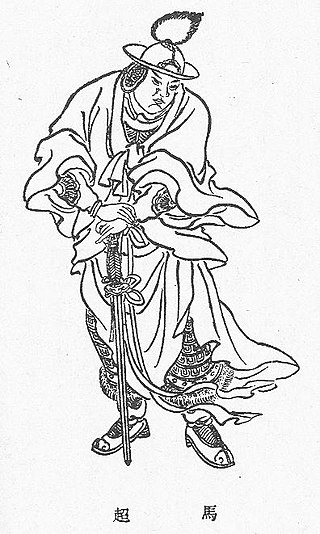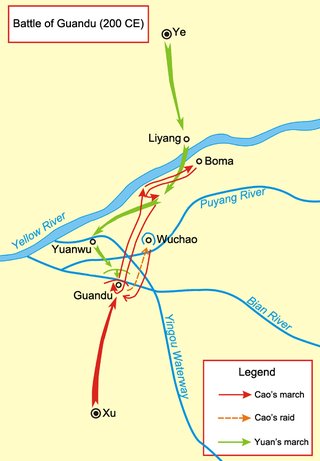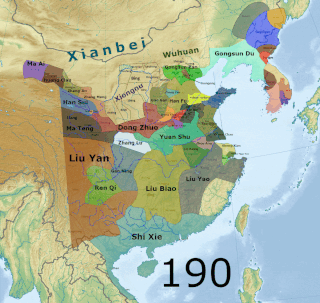Related Research Articles

Xiahou Dun, courtesy name Yuanrang, was a Chinese military general and politician serving under the warlord Cao Cao during the late Eastern Han dynasty of China. He served for a few months under Cao Cao's successor, Cao Pi, before his death. As one of Cao Cao's most trusted generals, Xiahou Dun aided the warlord in his campaigns against Lü Bu, Liu Bei, Sun Quan and others.

Ma Chao (176–222), courtesy name Mengqi, was a Chinese military general and warlord who lived in the late Eastern Han dynasty and early Three Kingdoms period of China. A descendant of the general Ma Yuan, Ma Chao was the eldest son of Ma Teng, a prominent warlord in Liang Province. In 211, he formed a coalition with Han Sui and other northwestern warlords and revolted against the Han central government, which was led by the warlord Cao Cao. The coalition broke up after losing the Battle of Tong Pass against Cao Cao's forces. Ma Chao initially retreated, but later returned to attack and seize control of Liang Province by killing the provincial inspector Wei Kang and forcing Wei Kang's subordinates to submit to him. About a year after Ma Chao started his uprising, Emperor Xian issued an imperial decree ordering the execution of Ma Chao's family members, who were in Ye city at the time. In the meantime, Wei Kang's subordinates, led by Zhao Ang, Yang Fu and others, rebelled against Ma Chao and forced him out of Liang Province. Ma Chao retreated to Hanzhong Commandery, where he borrowed troops from the warlord Zhang Lu, and returned to attack Liang Province but was ultimately defeated and driven back. Ma Chao took shelter under Zhang Lu for a while until around 214, when he heard that the warlord Liu Bei was fighting for control over Yi Province with Yi Province's governor, Liu Zhang. He defected to Liu Bei's side and assisted Liu Bei in capturing Yi Province from Liu Zhang. Ma Chao had served as a general under Liu Bei since then and participated in the Hanzhong Campaign in 219. He died in 222.

The Battle of Guandu was fought between the warlords Cao Cao and Yuan Shao in 200 AD in the late Eastern Han dynasty. Cao Cao's decisive victory against Yuan Shao's numerically superior forces marked the turning point in their war. The victory was also the point at which Cao Cao became the dominant power in northern China, leading to the establishment of the state of Cao Wei in the Three Kingdoms period.

Xiahou Yuan, courtesy name Miaocai, was a Chinese military general and politician serving under the warlord Cao Cao in the late Eastern Han dynasty of China. He is known for his exploits in western China in the 210s, during which he defeated Cao Cao's rivals Ma Chao and Han Sui in Liang Province and the surrounding areas, and forced several Di and Qiang tribal peoples into submission. He was killed in action at the Battle of Mount Dingjun while defending Hanzhong Commandery from attacks by a rival warlord Liu Bei. Xiahou Yuan's death was highly dramatised in the 14th-century historical novel Romance of the Three Kingdoms, in which he was slain by Liu Bei's general Huang Zhong during a surprise raid.

Han Sui, courtesy name Wenyue, originally named Han Yue, was a military general and minor warlord who lived during the late Eastern Han dynasty of China. For most of his life, he was active in Liang Province and was involved in several rebellions against the Han government and the warlord Cao Cao.

The military history of the Three Kingdoms period encompasses roughly a century's worth of prolonged warfare and disorder in Chinese history. After the assassination of General-in-chief He Jin in September 189, the administrative structures of the Han government became increasingly irrelevant. By the time of death of Cao Cao, the most successful warlord of North China, in 220, the Han empire was divided between the three rival states of Cao Wei, Shu Han and Eastern Wu. Due to the ensuing turmoil, the competing powers of the Three Kingdoms era found no shortage of willing recruits for their armies, although press-ganging as well as forcible enlistment of prisoners from defeated armies still occurred. Following four centuries of rule under the Han dynasty, the Three Kingdoms brought about a new era of conflict in China that shifted institutions in favor of a more permanent and selective system of military recruitment. This ultimately included the creation of a hereditary military class as well as increasing reliance on non-Chinese cavalry forces and the end of universal conscription.
Xiahou Mao, courtesy name Zilin, was a military general and marquis of the state of Cao Wei during the Three Kingdoms period of China. He was the second son of Xiahou Dun, a general who served under the warlord Cao Cao, while Xiahou Mao was a close friend of the founding Emperor Cao Pi. Xiahou Mao married Princess Qinghe, one of Cao Cao's daughters, though the marriage would be an unhappy one and he once faced accusation of treason from his own family.

The end of the Han dynasty was the period of Chinese history from 189 to 220 CE, roughly coinciding with the tumultuous reign of the Han dynasty's last ruler, Emperor Xian. It was followed by the Three Kingdoms era. During the end of the Han dynasty, the country was thrown into turmoil by the Yellow Turban Rebellion (184–205). Meanwhile, the Han Empire's institutions were destroyed by the warlord Dong Zhuo and fractured into regional regimes ruled by various warlords, some of whom were nobles and officials of the Han imperial court. The warlord Cao Cao took control of Emperor Xian and his court in 196 and began gradually reunifying the empire. Cao Cao ostensibly operated under Emperor Xian's rule, though in reality the emperor was a hostage.
Zhang Yan, born Chu Yan, also known as Zhang Feiyan, was the leader of the Heishan bandits during the late Eastern Han dynasty of China. He rose from a local rebel to master of a confederation that could hold off the Han and was able to maintain authority in Changshan until he chose to surrender to Cao Cao, getting enfeoffment that remained with his family.

Romance of the Three Kingdoms is a Chinese television series adapted from the classical 14th century novel of the same title by Luo Guanzhong. The series was produced by China Central Television (CCTV) and was first aired on the network in 1994. It spanned a total of 84 episodes, each approximately 45 minutes long. One of the most expensive television series produced at the time, the project was completed over four years and involved over 400,000 cast and crew members, including divisions of the People's Liberation Army from the Beijing, Nanjing and Chengdu military regions. Some of the dialogue spoken by characters was adapted directly from the novel. Extensive battle scenes, such as the battles of Guandu, Red Cliffs and Xiaoting, were also live-acted.

The Campaign against Dong Zhuo was a punitive expedition initiated by a coalition of regional officials and warlords against the warlord Dong Zhuo in 190 in the late Eastern Han dynasty. The members of the coalition claimed that Dong had the intention of usurping the throne by holding Emperor Xian hostage and by establishing a strong influence in the imperial court. They justified their campaign as to remove Dong from power. The campaign led to the evacuation of the capital Luoyang and the shifting of the imperial court to Chang'an. It was a prelude to the end of the Han dynasty and, subsequently, the Three Kingdoms period.
The Battle of Xingyang was a battle fought in 190 in the late Eastern Han dynasty as part of the campaign against Dong Zhuo. It took place when Dong Zhuo's retreating forces, led by Xu Rong, encountered the pursuing armies of Cao Cao at Xingyang. The battle ended in a victory for Dong Zhuo's forces, with Cao Cao being forced to retreat.
The siege of Jicheng was a part of the campaign Ma Chao initiated in an attempt to retake Liang Province after the coalition of Guanxi was defeated at the Battle of Tong Pass in the winter of 211 in the late Eastern Han dynasty.
The Battle of Lucheng of 213 was part of a rebellion led by Yang Fu against the warlord Ma Chao in the late Eastern Han dynasty. The revolt was initiated by disgruntled parties under the new rule of Ma Chao, who forcefully took over governorship of Liang Province from Wei Kang (韋康) in the siege of Jicheng.

Three Kingdoms is a 2010 Chinese television series based on the events in the late Eastern Han dynasty and the Three Kingdoms period. The plot is adapted from the 14th century historical novel Romance of the Three Kingdoms and other stories about the Three Kingdoms period. Directed by Gao Xixi, the series had a budget of over 160 million RMB and took five years of pre-production work. Shooting of the series commenced in October 2008, and it was released in China in May 2010.
The Liang Province rebellion from 184 to 189 started as an insurrection of the Qiang peoples against the Han dynasty in the western province of Liang in the second century AD in China, but the Lesser Yuezhi and sympathetic Han rebels soon joined the cause to wrestle control of the province away from central authority. This rebellion, which closely followed the Yellow Turban Rebellion, was part of a series of disturbances that led to the decline and ultimate downfall of the Han dynasty. Despite receiving relatively little attention in the hands of traditional historians, the rebellion nonetheless had lasting importance as it weakened Han Chinese power in the northwest and prepared that land for a number of non-Han-ruled states in the centuries to come.

The Battle of Tong Pass, also known as the Battle of Weinan, was fought between the warlord Cao Cao and a coalition of forces from Guanxi between April and November 211 in the late Eastern Han dynasty of China. The battle was initiated by Cao Cao's western expansion, which triggered uprisings in Guanxi. Cao Cao scored a decisive victory over the Guanxi coalition and established a hold of the Guanzhong region.
Zhao Ang, courtesy name Weizhang, was a Chinese politician who lived in the late Eastern Han dynasty and was aligned with the faction that would later become the state of Cao Wei in the Three Kingdoms period. He is best known for resisting the warlord Ma Chao in Liang Province in the 210s. His wife, Wang Yi, is famous for supporting her husband throughout their conflict with Ma Chao.
Jiang Xu, courtesy name Boyi, was a military general who lived in the late Eastern Han dynasty of China. He is best known for his involvement in the conflict between the warlord Ma Chao and the Han central government in the 210s CE.
References
- ↑ de Crespigny, Rafe. "To Establish Peace" (PDF). Digital Collections. Retrieved 3 August 2013.
In the spring Ma Chao asked Zhang Lu for soldiers so that he could go north and recapture Liang province, and Zhang Lu sent him off to besiege Qi Mountain.
- ↑ de Crespigny, Rafe. "To Establish Peace" (PDF). Digital Collections. Retrieved 3 August 2013.
Jiang Xu told Xiahou Yuan of the emergency, but Xiahou Yuan's officers recommended he wait for orders from Cao Cao. "The Duke is now at Ye city," observed Xiahou Yuan, "and it is four thousand li there and back.1 Jiang Xu and his people will be destroyed before any report can reach him. That is no way to bring help when it is needed." So he marched, sending Zhang He as advance guard with five thousand horse and foot. Ma Chao was defeated and fled.
- ↑ de Crespigny, Rafe. "To Establish Peace" (PDF). Digital Collections. Retrieved 3 August 2013.
Han Sui was at Xianqin. Xiahou Yuan planned a surprise attack to capture him, but Han Sui fled. Xiahou Yuan chased after him towards Lueyang city.2 He was thirty li behind Han Sui,3 and his officers wanted to maintain the pursuit, but then someone suggested they should attack the Di barbarians of Xingguo.
- ↑ de Crespigny, Rafe. "To Establish Peace" (PDF). Digital Collections. Retrieved 3 August 2013.
Han Sui's troops are well-trained and Xingguo has strong walls," judged Xiahou Yuan. "Whichever we attack, we shall gain no swift success. Much better deal with the Qiang at Changli.5 Many of them have joined Han Sui's army, but they will certainly come back to help their families. If Han Sui lets them go to look after their families, he will be left without support; but if he accompanies them to relieve Changli, our government troops can meet him in the field, and then we are sure to take him.
- ↑ de Crespigny, Rafe. "To Establish Peace" (PDF). Digital Collections. Retrieved 3 August 2013.
When the officers saw the size of Han Sui's army, they wanted to build a stockade and moat to fight on the defensive. Xiahou Yuan, however, said, "We have marched and counter-marched a thousand li. If we now start building and digging, our soldiers will be exhausted and useless. Though the bandits come in great numbers, they can easily be deal with." He beat the drums, and Han Sui's army was completely defeated.
- ↑ de Crespigny, Rafe. "To Establish Peace" (PDF). Digital Collections. Retrieved 3 August 2013.
Then Xiahou Yuan went forward to besiege Xingguo. King Qianwan of the Di fled to Ma Chao, and the remainder of his forces surrendered. Xiahou Yuan turned again to attack Gaoping and the Chuge [group of the Xiongnu]. He destroyed both of them.
- Chen, Shou. Records of the Three Kingdoms (Sanguozhi).
- Pei, Songzhi. Annotations to Records of the Three Kingdoms (Sanguozhi zhu).